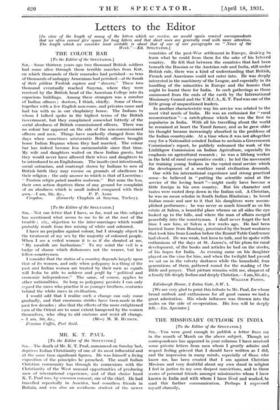MR. K. T. PAUL
[To the Editor of the SPECTATOR.] Sin,—The death of Mr. K. T. Paul, announced on Sunday last, deprives Indian Christianity of one of its most influential and at the same time significant figures. He was himself a living exposition of the principles he preached. The small Indian Christian community has through its connexions with the Christianity of the West unusual opportunities of producing Men of international experience, and of that choice band K. T. Paul was, by common consent, one of the chief. He had travelled repeatedly in America, had countless friends in Britain, and was also an assiduous student of the newer
countries of the post-War settlement in Europe, desiring to learn what he could from them for the sake of his beloved country. He felt that between the countries that had been beneath the Russian or the Austrian rule and India, still under British rule, there was a kind of understanding that British, French and Americans could not enter into. He was deeply interested in the machinery of the League, and especially in its handling of the minorities in Europe and the lessons that might be learnt there for India. In such gatherings as those summoned from the ends of the earth by the International Missionary Council and the Y.M.C.A., K. T. Paul was one of the little group of unquestioned leaders.
In another characteristic way his service was related to the most vital needs of India. He was an enthusiast for " rural reconstruction "—a catch-phrase which he was the first to popularise in India. With all his travelling about the world he remained at heart the Tamil farmer, and as he grew older his thought became increasingly absorbed in the problems of the Indian countryside. At a time when it was not altogether easy for a Nationalist-minded Indian to acclaim a Government Commission's report, he publicly welcomed the work of the Linlithgow Commission on Indian Agriculture, especially its emphasis on agricultural research ; he was a lifelong worker in the field of rural co-operative credit ; he led the movement for training young Indians in the varied rural service which the development of a worthier rural civilisation demands.
One with his international experience and strong practical sense—he believed in " putting the scientific mind at the service of the loving heart "—might easily have become a little foreign in his own country. But his character and tastes were rooted deep down in the Indian soil. A Christian, he was no mean scholar in South Indian Hinduism ; he loved Indian music and saw to it that his daughters were accom- plished performers ; he was never so much himself as on his estate at Salem, a beautiful place whence on all sides the eye looked up to the hills, and where the man of affairs merged peacefully into the countryman. I shall never forget the last time I saw him, at Salem a few weeks ago. He had been hurried home from Bombay, prostrated by the heart weakness that took him from London before the Round Table Conference had closed. He was weak, but keen to talk, and he spoke with enthusiasm of the days at St. James's, of his plans for rural development, of the books and articles he had on the stocks, of his hopes for India. ' As evening came on his daughter played on the vina for him, and when the twilight had passed we sat on in the velvety darkness while the household, four generations of them, gathered round for the reading of the Bible and prayer. That picture remains with me, eloquent of a family life deeply Indian and deeply Christian.—I am, Sir, &c.,
WILLIAM PATON.
Edinburgh House, 2 Eaton Gate, S.W. I.
[We are very glad to print this tribute to Mr. Paul, for whose broad outlook and enthusiasm for all good causes we had a great admiration. His whole influence was thrown into the scales on the side of co-operation. His loss will be deeply felt.—En. Spectator.]














































 Previous page
Previous page